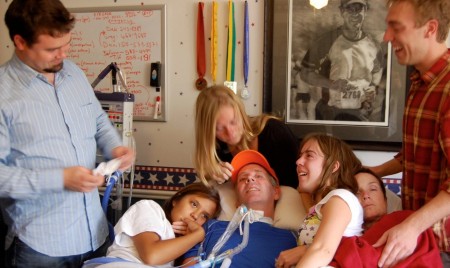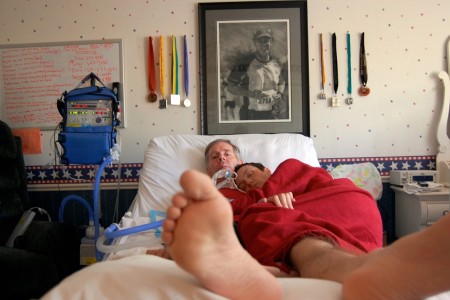Dan Marshall’s book about his father’s death – while his mother was stricken with cancer – is possibly the most scatalogical memoir of its kind ever, and now Hollywood has come knocking
By Rory Carroll

Dan Marshall sips an iced coffee under a Los Angeles sun and mulls the notion of Hollywood sanitising his memoir, the story of how he and his siblings dealt with terminally ill parents during an anguished year in the Mormon capital of Salt Lake City. Marshall shakes his head and gives a faint smile. “It’d tear the balls off the thing if they made it PG-13.”
It would indeed. Home Is Burning, published this month and due to be made into a film, dives deep into the pain and grief of caring for a father who slowly wastes away, and a mother who hovers close to death. It also plumbs the cacophonous dysfunction of a family stumbling through the ordeal with black humour, fart jokes, painkillers, booze, feuds, sex and swearing – epic, ungodly, obscene, unrepentant, relentless swearing.
“It’ll have to be R-rated,” says Marshall. “There’s a lot of death and dying but with South Park humour applied to normally difficult and sentimental situations. I’m making jokes about wiping my dad’s ass.”
The 300-page memoir jokes about everything: the cruelty of amyotrophic lateral sclerosis (ALS), also known as Lou Gehrig’s disease, which killed Bob Marshall in 2008; the brutal side effects of Debbi Marshall’s cancer treatment; the vicious sibling arguments; the pious Mormon neighbours.
One unforgettable section details Debbi’s declaration that she will perform oral sex on her husband – by then confined to a bed and respirator – daily until he dies. “My mom was beyond proud of the blow-job-a-day goal. I don’t know if it was because she was all fucked up on Fentanly or what, but she seemed to bring it up any chance she got. ‘A blow job a day. Not a bad deal,’ I heard her explain to a visitor. ‘You wouldn’t think it, but his penis is still strong.’”

The Marshall clan is barging into a terminal illness genre rife with sentimentality – think The Fault in Our Stars, Before I Die, Tuesdays with Morrie – with a unique strain of profane, scatological humour. Prominent memoirists have endorsed Home Is Burning. James Frey, author of A Million Little Pieces, called it hilarious and heartbreaking. Justin St Germain, author of Son of a Gun, deemed it self-aware and ruthlessly honest: “Dan Marshall might be a self-described spoiled white jerk, but he’s also a depraved comedic genius.” Publishers Weekly called him the literary love child of Dave Eggers and David Sedaris.
In person Marshall, 33, is softly spoken, almost shy. He mocks himself in the memoir as a dumpy, boozy, gummy bear-chomping screw-up. But the figure who settles into the corner of a restaurant terrace, seeking shade on a baking afternoon, is somewhat reformed. He has quit drinking, jogs and has, by his own measure, matured.
Conjuring success from tragedy has been bittersweet. His beloved dad is dead and his mother is still ill – loss and pain which redirected Marshall from a job in public relations.
He chronicled his experience as a caregiver in Facebook posts: raw, unfiltered outbursts alternately expressing solidarity with and resentment at those around him, and bewilderment at their predicament. After his father’s death Marshall moved to LA, studied screenwriting and found a toehold in Hollywood writing comedy. The memoir, his first book, has vaulted him into another league.
The independent studio New Line snapped it up and contracted Marshall to turn it into a screenplay. Jonathan Levine, who directed the zombie comedy Warm Bodies, will direct the film and Miles Teller, the star of Whiplash and Divergent, will play Marshall.

“I was on track in the corporate world before dad got sick,” he says, stirring melting ice. “It changed my path.” It feels strange to be on the cusp of celebrity. “I feel less of a fraud. But it’s weird because no one knows who the fuck I am.” He pauses. “Some mornings I still wake up and feel like such a loser. I’ve no girlfriend and I write fart jokes.” He smiles but is completely serious.
Back in 2007, Marshall was in his first post-college job, enjoying independence from his family and dating his dream girl, a charmed “dicking around” existence. Then out of the blue the phone call which changed everything: your dad has ALS, come home.
After some hesitation, he did. The family lived in a big, plush house in Salt Lake City, the only non-Mormons in their neighbourhood. His mother, who had been battling non-Hodgkin’s lymphoma since 1992, was a spirited but ravaged chemotherapy veteran whose survival confounded doctors. She cursed like a sailor even before her life hung by a thread.
Bob had been the family’s anchor, a calming, levelheaded businessman who ran several small newspapers, nursed his wife, guided his children and competed in marathons. He was 53 when he was ambushed by the neurodegenerative disease which would gradually paralyse and asphyxiate him.
Debi decreed the family would care for him at home even though she was weak and woozy from medication. Dan’s sisters were also constrained. Tiffany, the eldest, was tied up with studies, work and a boyfriend (nicknamed “big cock Brian” after an ill-advised admission to her mother), and alienated by the arrival of Dan, who bullied her.
Chelsea was a troubled teen who drank too much and was having, it emerged, a clandestine romance with her soccer coach. Michelle, also a teen, had Asperger’s and struggled to understand her father’s plight. She sought refuge in dance and lavatorial jokes, which delighted Dan but no one else.

The burden of care fell mainly on Dan and his brother Greg, who returned from university in Illinois, where he had enjoyed the freedom to be gay that was denied him in Utah. They converted a bedroom into a de facto intensive care unit, learned how to use a respirator, transported their father in a wheelchair and rickety bus, and bathed, changed and fed him.
As Bob turned skeletal and lost his voice, mother and siblings fought, reconciled and fought anew, with Dan and Tiffany in particular flaying verbal strips off each other. “Everything in that situation was heightened,” Dan recalls. “And I was a lot more rambunctious, and drinking. When you’re around family you’re more free in what you say and do because they’re family and will still love you no matter what. People’s true colours come out.”
A fierce devotion to his father sears through the pages. “It would have been easier if I’d hated him. But I loved him. He was such a good guy.”
Bob Marshall was stoic about his plight – and the sometimes chaotic, X-rated efforts to care for him. Dan programmed his Stephen Hawking-style communication device to include an icon with a limp penis. When clicked, it said: “Boy, I could use a blow job.” The line cracked up the family and prompted a tender unity: “Dad in the heart of the house, his little bald wife by his side, his children resting their hands on his shoulder. We all took in the moment.”
As other dramas unfolded in the wings – Chelsea marrying her soccer coach, Dan going on an ecstasy-fuelled one-night stand after his girlfriend dumped him – Bob Marshall eventually decided to end his agony. He decreed that the respirator would be turned off on 22 September, the first official day of autumn, his favourite season. The family, nerves shredded, weepy and frightened, referred to it as the “big unhook”. A doctor ensured there was no pain. Neighbours’ children released balloons into the sky.
Debbi is the star of the book, a fighter and survivor often half-crazed by medication. She has since had a mastectomy and now wears a wig. “She keeps texting me ideas about who should play her – Meryl Streep, Sandra Bullock, Laura Linney. But I tell her we’ll get Danny DeVito,” says Dan. There is talk of Tom Hanks playing Bob. “That would be bonkers. My dad loved Forrest Gump.”
The screenplay has a rom-com structure: selfish oaf learns life lessons and falls back in love with his family. It happens to be true, says Dan. He has reconciled with Tiffany and feels closer than ever to his family, all of whom, after some hesitation, blessed the book. His advice to other families facing similar ordeals: “Spend as much time as you can with each other. And forgive each other. Whatever resentments you’re hanging on to, let go.”
Complete Article HERE!
